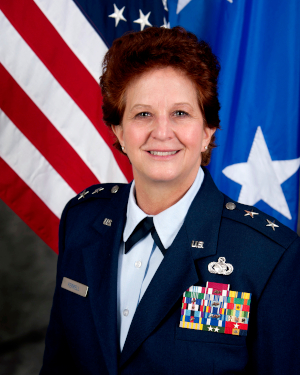MAJOR GENERAL DAWN FERRELL, DEPUTY ADJUTANT GENERAL - AIR
According to the Federal Emergency Management Agency, Texas leads all states in federal disaster declarations by a significant margin. It is therefore critical that our forces remain trained and ready at all times to respond any emergency or non-emergency situation for which we are asked to provide support. We do this through numerous mechanisms, including our Mission Ready Packages (MRPs), Civil Support Teams (CSTs), and Counter-Drug Task Force which recently celebrated its 30th Anniversary. The scalable nature of our responses is vital to our mission success, and we are often held up as a model to other states for how to best prepare for, and respond to, disasters and dangerous situations here at home.
TMD brings unique assets to the field in support of homeland response, and these are exemplified in our MRPs. In the event of a hurricane or other large-scale event, we can rapidly shift and mobilize personnel in numbers that no other agency can duplicate. When required to react to no notice Search and Rescue (SAR) missions, the SAR companies bring specialized skill sets that are not available elsewhere, saving lives. Our conduct during these missions has led Texans and Americans to feel safe and secure as soon as they see one of our people on the scene, ready to offer assistance.
Homeland response efforts provide us with a crucial opportunity to enact our value of “communicate and partner”. Our teams work with a myriad of local, state, and federal agencies, and our ability to effectively combine efforts is mission critical. Our military expertise and training is central to both large and small response efforts; however our ability to effectively communicate with those we mobilize in support of is critical the effective use of those skill sets. During the Deer Park Fires of this past spring, our CST Soldiers and Airmen not only supported first responders operationally, but also worked closely with civilian agencies such as the school district, providing guidance on when it would be safe for students to return.
Our homeland focused interagency partnerships are not limited to Texas-specific groups and events. Last month, the TMD Chemical, Biological, Radiological, and Nuclear (CBRN) Response Enterprise (CRE) elements participated in the Joint Task Force-Civil Support (JTF-CS) CBRN Summit at Fort Hood. This was a Title 10, 2 Star Command summit which involved interagency coordination between DOD (T32 and T10), FBI, DOE, DTRA, and private industry. Participants met to discuss the response efforts related to National Planning Scenario #1 – a 10 kiloton nuclear detonation in the homeland.
Our force continues to prove that we can sustain our warfighter missions abroad while simultaneously being the premier homeland response force. Thank you for all you do to maintain the trust and respect of our state and nation.
DUTY, HONOR, TEXAS
 Maj. Gen. Dawn M. Ferrell is the Deputy Adjutant General-Air for the Texas Military Department and also serves as Commander for the Texas Air National Guard. She is the principle advisor to the Adjutant General for all Texas Air National Guard issues. She is responsible for formulating, developing, and coordinating all programs, policies, and plans for three Wings and more than 3,200 Air National Guard personnel throughout the state of Texas.
Maj. Gen. Dawn M. Ferrell is the Deputy Adjutant General-Air for the Texas Military Department and also serves as Commander for the Texas Air National Guard. She is the principle advisor to the Adjutant General for all Texas Air National Guard issues. She is responsible for formulating, developing, and coordinating all programs, policies, and plans for three Wings and more than 3,200 Air National Guard personnel throughout the state of Texas.